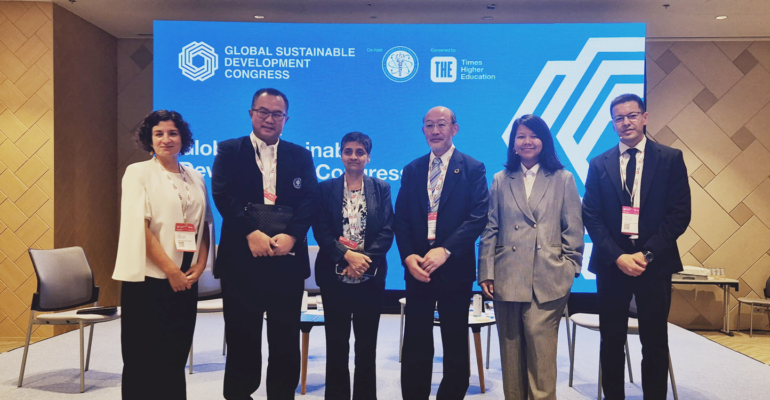Rector of IPB Shares Efforts in Achieving SDGs at the Global Sustainable Development Congress in Bangkok

Rector of IPB University, Prof Arif Satria, shared experiences on the strategic efforts done by IPB University to achieve the Sustainable Development Goals (SDGs) at the Global Sustainable Development (GSD) Congress recently held in Bangkok.
As a higher education institution with a high commitment to achieving the SDGs, IPB University actively develops programs that contribute to achieving the SDGs. These efforts include educational programs, community empowerment involving cooperation with local governments, the private sector, and non-governmental organizations, and on-campus implementation.
In session with the topic ‘Bridging the knowledge gap on biodiversity systems,’ Prof Arif shared his views on the role of leaders in achieving the SDGs, especially in education. According to him, a curriculum design that can answer future challenges and innovations in learning is essential to increase young generations’ awareness of sustainability.
Prof Arif explained IPB University’s experience designing the 2020 Curriculum (K2020) and creating learning channels that align with students’ talents and interests.
“IPB University makes sure that K2020 is rich with sustainability content to increase students’ literacy in achieving SDGs. With increased literacy, awareness, and key soft skills, including critical thinking, problem-solving, and leadership, students are expected to become agents of change in society,” said Prof Arif.
In another session, the Director of Global Connectivity of IPB University, Dr Eva Anggraini, shared about best practices that have been implemented by IPB University as a commitment to achieving the SDGs.
“As one of the signatories of the SDG Accord, IPB University always actively reports to that nonprofit organization. One of the reports that have been delivered by IPB University was related to the One Village One CEO (OVOC) program, which contributes to the achievement of SDG 8 (Decent Work and Economic Growth),” she explained.
The OVOC program has been implemented in more than 500 villages in Indonesia that involve students and lecturers in collaboration with local governments and the private sector. In OVOC, students act as CEOs and work together with local economic agents to identify the village’s signature products, develop products by introducing campus innovations to increase added value, and open market access at the local, national, and even export levels.
“This OVOC program aims to build students’ social entrepreneurship spirit and also raise students’ awareness towards the importance of creating sustainability in society, especially in the economic aspect,” said Dr Eva.
Participation in this GSD Congress is part of IPB University’s efforts to increase visibility in the global community, especially in higher education. This global event brings academics, government, nonprofit organizations, and the private sector from all over the world, serves as a platform to share knowledge and experiences in implementing programs to achieve the SDGs, and is also very beneficial in building regional and international collaborative networks. (*/Rz) (IAAS/EXC)



